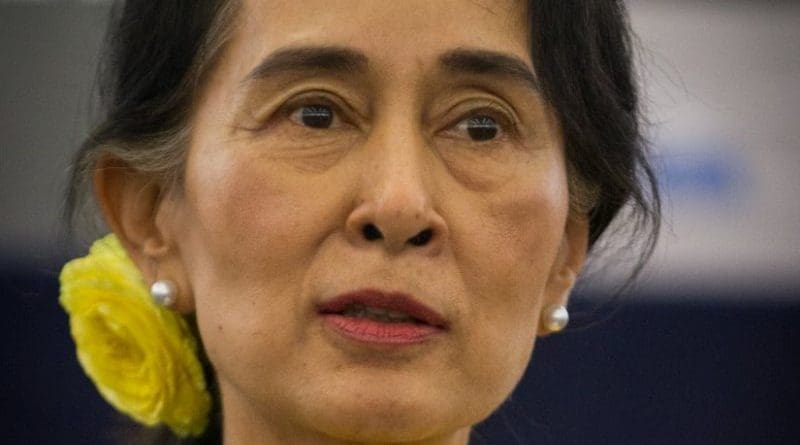Burma: Ethnic Armed Groups Join Peace Talks
By UCA News
By John Zaw
Ethnic armed groups from the Christian-stronghold states of Karen, Chin and Kachin are among 15 groups attending Myanmar’s latest round of 21st Century Panglong peace talks.
The five-day conference, May 24-28, is the second session under Aung San Suu Kyi’s government to bring peace to seven ethnic states that have experienced vast and bitter conflicts for nearly 70 years.
However, little progress to reach a deal has been made to date and the de-facto leader has fallen short in her attempt to bring all 20 militia groups to the table.
An alliance of seven ethnic armed groups known as the United Nationalities Federal Council (UNFC), who are yet to sign the nationwide ceasefire agreement (NCA), refused to attend as they were invited as special guests with “no equal status.”
“Time is precious and getting peace is very important for our country. We need to try bringing all militias to the conference,” Manam Tu Ja, a Catholic and chairman of Kachin State Democracy Party, told ucanews.com.
Rev. Saw Matthew Aye, a member of the Union Level Joint Monitoring Committee, who is attending the conference as a special guest, recognized the absence of some groups is not ideal, but retains hopes of an agreement.
“We can’t solve the decades-long disputes in just five days, but the discussions and agreement from the conference will help lay a foundation for upcoming peace talks towards lasting peace,” Aye told ucanews.com.
Palaung (Ta’ang National Liberation Army), the Arakan Army and Kokang (Myanmar National Democratic Alliance Army) who didn’t attend the first peace conference last August, are attending as invited special guests. They are joined at the conference by a northern alliance, comprising the United Wa State Army, Kachin Independence Army (KIA) and National Democratic Alliance Army (NDAA-Mongla).
Suu Kyi reaffirmed her government’s commitment to achieving peace by laying out a policy of bringing all remaining non-signatories to sign the peace pact aimed at creating a federal democratic union.
“We will not resort to exerting pressure through populist politics to achieve our goals, but we will instead strive to reach an agreement acceptable to all with open, frank and inclusive dialogue,” Suu Kyi told the packed hall at the opening speech of the conference, May 24.
Lahpai Seng Raw, former director of Metta Foundation, a non-governmental organization that supports internally-displaced people through healthcare, agriculture, peace projects and humanitarian aid, is at the conference. An ethnic Kachin and a 2013 Ramon Magsaysay Award winner, Seng Raw said that there must be equal status among the ethnic armed groups who are signatories of NCA and non-signatories.
“From my point of view, the government needs to announce a unilateral ceasefire agreement in the country and then bring all ethnic armed groups to the negotiation table,” Seng Raw told ucanews.com.
Some 1,600 participants, including U.N. Secretary General Ban Ki-Moon, attended the opening ceremony of the first session of peace talks in Naypyidaw, Aug. 31 to Sep. 4, 2016.
More than 700 participants, including government, military, parliament, political parties, ethnic armed groups, civil society groups and diplomats, joined the opening ceremony of the second session.
Military’s stance
Myanmar’s military chief Min Aung Hlaing has asserted its military stance on the NCA that is the only way to get peace in the country.
“Signing the NCA is not an accord to surrender the ethnic armed groups,” Min Aung Hlaing said in an opening speech on May 24.
Some non-signatories, such as the northern alliance led by the UWSA, are considering a new approach to the peace process.
“Ignoring this and pursuing other or the second way will be an attempt to loathe the establishment of a Union based on peace, democracy and federalism. As such, we have to assume that the attempt is tantamount to grabbing power and splitting from the Union through armed struggle line,” warns Min Aung Hlaing.
The military, in a classic demonstration that its political heft remains daunting, despite being rejected by voters at the ballot box, has escalated its offensive against Kachin, Shan, Palaung and Kokang groups in Kachin and northern Shan states.
Long-running conflicts in Myanmar’s smaller states with large Christian populations — Chin, Karen, and Kayah — have ended but forced more than 100,000 people across the Thai border and into refugee camps.
The six-year-old resumption of a fight that had been dormant for 17 years in 2011 resulted in more than 100,000 people forced into camps for internally displaced people in Kachin and northern Shan states.
Suu Kyi’s father, General Aung San, led the country to independence from Britain had reached an agreement regarding self-autonomy and federalism with the Kachin, Shan and Chin ethnic groups in 1947, but failed to secure several other ethnic groups.
Soon afterward, Aung San was assassinated and the deal was never fulfilled. In the aftermath, the ethnic groups took up arms against the central government.

